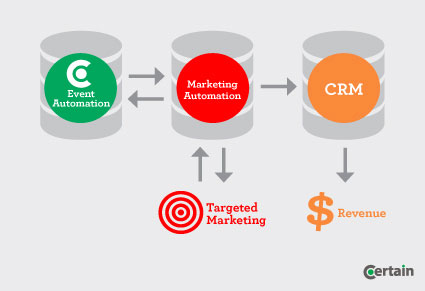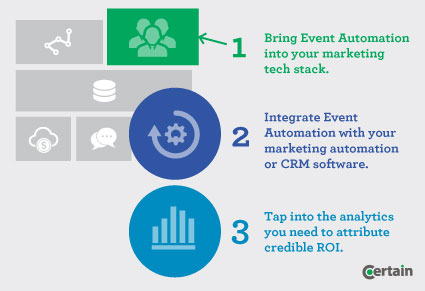An Event and Marketing Automation Guide on How to Define, Measure, and Analyze Event Success
What if you could present your CEO with a marketing guide that not only explains the importance of marketing automation in the tech stack, but also how to use event technology and marketing automation to increase revenue? What could you do with your time if you could spend less of it defending why events are an integral part of your marketing strategy, and could focus more on how to produce events that will increase your pipeline and grow revenue?
Advances in event management software have enabled ever-increasing levels of automation for event planners and marketers. According to Certain’s Product Manager, Mike Earley, this automation has “freed marketers to spend more time optimizing event ROI through bi-directional syncing between their event management and marketing automation systems. With fully enabled syncing between these two critical systems, there is a new wealth of rich data to drive more intelligent nurturing and sales follow-up.”
Well, now you have a guide that can help you harness the power of rich attendee data captured at events to inform your marketing strategy, create omni-channel campaigns, and convert leads into customers. Certain Inc. has partnered with Oracle Marketing Cloud for our data-driven marketing series, a series designed to provide marketers with the most effective ways to integrate your event and marketing automation systems into your marketing tech stack so you can deliver credible ROI. First, we kicked off the series with our How to do Event Marketing Like a Data-Driven Machine infographic, featuring best event and marketing automation practices, then we tested your knowledge in our Event and Marketing Automation Readiness Quiz, and now, we’re going in deep on the evolution of event marketing with our event and marketing automation guide!
So what marketing technology should you invest in, and which types of technology will enable you to capture data that can increase revenue? When it comes to data-driven marketing, we measure everything — every activity, lead, and sale, but are you measuring your marketing technologies and how they directly impact event success? Do you have a bird’s eye view of how event marketing affects your company? In this guide, we’ll be answering some of the most important questions marketers and event professionals have about events. We not only cover how events evolved and why they’ve come to take up such a significant portion of marketing spend, but also helpful advice on building your marketing tech stack as well as best practices for integrating marketing and event automation.
Why Events Are an Essential Part of Marketing Spend
According to the State of B2B Marketing Report, events take up 28% of the marketing spend for B2B companies. Offline events are an excellent way to source new prospects, cross-sell and upsell to existing customers, and to increase brand awareness. In fact, 64% of B2B companies exhibit at events to gather leads and fill their marketing and sales pipeline.
Beyond driving revenue, the power of in-person events includes educating prospects and customers, developing personal relationships, and shortening the time from initial customer contact to closing the sale by meeting prospects face-to-face. Events give brands the opportunity to capture rich prospect data, from buying signals to customer interactions, so that marketers and sales teams can contact prospects with targeted, informed follow-up. In short, events are the foundation to filling a B2B marketing and sales pipeline.
How Events Have Evolved
In the early 90’s, the world of events was concentrated on logistics — not anymore! With the rise of data-driven marketing, the world of events has changed. In the early 2000’s, email-marketing, mobile, and event registration entered the live events stage. Then, marketers learned that they could leverage the information that they captured at events to create informed follow-up.
So, after 2010, there was an important shift from the logistical/registration aspects of events to data collection at events. Marketing automation, lead scoring, and developing nurture campaigns became integral parts of events. And now, in 2016, with the creation of event automation, the need for fully-integrated event and marketing automation systems that trigger targeted campaigns, create follow-up actions for sales and marketing teams, and that streamline event processes that were once done manually are key factors for any effective marketing and sales strategy.

Why Event and Marketing Automation Are Integral To Your Marketing Tech Stack
It is getting increasingly more difficult for marketers to navigate the marketing technology landscape. There are now 3874 discrete martech vendors! So what should you keep in mind when trying to optimize your stack?
Marketers need to think of what technologies or tools will help them optimize their sales funnel, gain greater insight into their target demographic, implement lead-tracking, and increase marketing ROI. When marketing and event automation work together, it enables marketers to capture and convert prospects, nurture leads, and analyze data collected during all stages of the event lifecycle.

Best Marketing and Event Automation Practices
So what are best practices for marketing and event automation that can give marketers valuable insights and drive Event ROI? Before an event, you want to define your audience and segment your event invitees, then personalize your invitations and created limited time offers like promotions in order to drive attendee registrations. During the event, marketers should capture data at check-in, at sessions, 1-on-1 appointments, and booth visits. By capturing attendee behavior during the event, these behaviors directly translate into buying signals for timely, post-event follow-up.
It is important to recognize the importance of data integration with your marketing and event automation systems in order to have a successful event. Data captured from the entire event lifecycle, from registration to event interactions to post-event evaluation, produces an engagement score and informs lead scoring. Then, after the event, sales and marketing teams can reach out to attendees and eventually, convert prospects into customers.
With event and marketing automation fully integrated, marketers now have a full line of sight into all stages of the event lifecycle. By capturing data before and during the event, connecting that data to your marketing automation system, and then analyzing and attributing the results, marketers have the keys to effectively measure event ROI.


